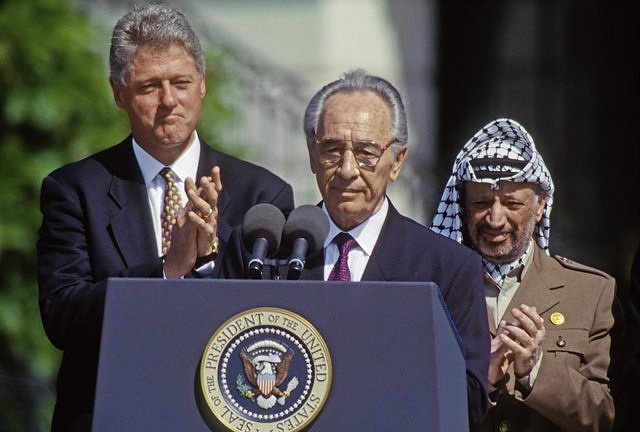The failure of the Oslo Accords has led to successive escalations of violence
MADRID, 7 Oct. (EUROPA PRESS) -
Israel has been in a state of war since this Saturday, after one of the most forceful military challenges in the recent history of the conflict with the Palestinians. The attack orchestrated from the Gaza Strip by Hamas comes less than a month after the thirtieth anniversary of the Oslo Accords, a theoretical framework for peace.
These agreements were signed on September 13, 1993 at a summit in which the Prime Minister of Israel, Isaac Rabin, the Palestinian President, Yasir Arafat, and the American President, Bill Clinton, participated, and were signed on the Palestinian side by the current president. of the Palestinian Authority, Mahmoud Abbas, negotiator during the contacts.
The documents contained important commitments, including the recognition of Israel by the Palestine Liberation Organization (PLO) and the recognition of the latter by Israel, as representative of the Palestinians, as well as the creation of the Palestinian Authority to take over government responsibilities in the West Bank and Gaza Strip.
However, these agreements - reinforced by the signing of the Oslo II Accords in 1995 in the Egyptian city of Taba - completed their five-year application period without their main points being transferred to the field.
The agreements contemplated that after this period the parties would address talks on permanent status issues, including borders, refugees and the situation in Jerusalem - considered by Israel and Palestine as their capital -, although the 1995 assassination of Rabin to hands of an Israeli fundamentalist and a wave of attacks by the Islamic Resistance Movement (Hamas) in 1996 caused a freeze in contacts.
Despite this, Israel and the Palestinian Authority signed the Hebron Protocol in January 1997 - which contemplated the transfer of most of this West Bank city to Palestinian control - and the Wye Memorandum in October 1998 - after a summit between Arafat and Benjamin Netanyahu-- for Israel's withdrawal from other Palestinian territories.
Finally, a controversial visit by then Israeli opposition leader Ariel Sharon to the Esplanade of the Mosques - known to Jews as the Temple Mount - in September 2000 led to the outbreak of the Second Intifada, which resulted in at the end of carrying out a peace process due to the divergences between the parties.
In fact, just a few months before, a summit had been held at Camp David in which Arafat and the then Israeli Prime Minister, Ehud Barak, participated, which concluded without an agreement and with both parties presenting to the public very distant positions on the talks, which they attempted repeat the success achieved in 1978 with the Camp David Accords, which marked the peace agreement between Israel and Egypt.
The blow of the failure of the Oslo Accords has been followed by failed peace initiatives over the past two decades, including the 2002 Arab Peace Initiative -- launched under the aegis of the Arab League and one of the main proposals on the table-- and the talks between the parties in 2007, 2010 and 2013.
Likewise, Abbas presented a peace plan in 2014 that was rejected by Israel and the United States, while the push by former US President Donald Trump with the proposal presented in 2017 came to nothing due to the frontal rejection of the Palestinian authorities of the 'agreement'. of the century', which included Jerusalem as the "indivisible" capital of Israel.
Trump's initiative, however, led to a diplomatic boost that ended in 2020 with the signing of what are known as the 'Abraham Accords', which led to the normalization of relations between Israel and Bahrain, the United Arab Emirates (UAE), Morocco. and Sudan, the first countries to reach a pact of this type since Jordan in 1994.
Israel also aspires to sign an agreement with Saudi Arabia in the short term, although any progress is now complicated, given that Riyadh has also conditioned its position on achieving some type of concession for its theoretical Palestinian allies.
On the other hand, contacts between Israelis and Palestinians had already remained completely at a standstill, with the respective positions distant and a constant trickle of violent incidents that has become especially palpable this year.
Several terrorist attacks on Israeli soil, with attacks in both Jerusalem and Tel Aviv, and a succession of operations by Israeli forces on the occupied territories, including a macro operation on Jenin in early July, have exposed the latent tension.

 Exploring Cardano: Inner Workings and Advantages of this Cryptocurrency
Exploring Cardano: Inner Workings and Advantages of this Cryptocurrency Seville.- Economy.- Innova.- STSA inaugurates its new painting and sealing hangar in San Pablo, for 18 million
Seville.- Economy.- Innova.- STSA inaugurates its new painting and sealing hangar in San Pablo, for 18 million Innova.- More than 300 volunteers join the Andalucía Compromiso Digital network in one month to facilitate access to ICT
Innova.- More than 300 volunteers join the Andalucía Compromiso Digital network in one month to facilitate access to ICT Innova.-AMP.- Ayesa acquires 51% of Sadiel, which will create new technological engineering products and expand markets
Innova.-AMP.- Ayesa acquires 51% of Sadiel, which will create new technological engineering products and expand markets Death toll rises to 107 from floods caused by heavy rains in southern Brazil
Death toll rises to 107 from floods caused by heavy rains in southern Brazil BBVA is willing to assume the possible reputational risk if the takeover bid for Sabadell does not go ahead
BBVA is willing to assume the possible reputational risk if the takeover bid for Sabadell does not go ahead Takeda earns 54% less at the end of its year and announces a restructuring plan
Takeda earns 54% less at the end of its year and announces a restructuring plan The Ibex 35 stands out from Europe and falls 0.92% affected by the collapse of BBVA after the takeover bid for Sabadell
The Ibex 35 stands out from Europe and falls 0.92% affected by the collapse of BBVA after the takeover bid for Sabadell How Blockchain in being used to shape the future
How Blockchain in being used to shape the future Not just BTC and ETH: Here Are Some More Interesting Coins Worth Focusing on
Not just BTC and ETH: Here Are Some More Interesting Coins Worth Focusing on Expociència expects to receive more than 4,000 visitors in the Science Park of the University of Valencia
Expociència expects to receive more than 4,000 visitors in the Science Park of the University of Valencia They develop devices for the precise diagnosis of cancer patients
They develop devices for the precise diagnosis of cancer patients UMH researchers are working on a high-quality apricot crop that requires less irrigation water
UMH researchers are working on a high-quality apricot crop that requires less irrigation water The UPV develops an application to improve the quality of life of patients with glioblastoma
The UPV develops an application to improve the quality of life of patients with glioblastoma A million people demonstrate in France against Macron's pension reform
A million people demonstrate in France against Macron's pension reform Russia launches several missiles against "critical infrastructure" in the city of Zaporizhia
Russia launches several missiles against "critical infrastructure" in the city of Zaporizhia A "procession" remembers the dead of the Calabria shipwreck as bodies continue to wash up on the shore
A "procession" remembers the dead of the Calabria shipwreck as bodies continue to wash up on the shore Prison sentences handed down for three prominent Hong Kong pro-democracy activists
Prison sentences handed down for three prominent Hong Kong pro-democracy activists ETH continues to leave trading platforms, Ethereum balance on exchanges lowest in 3 years
ETH continues to leave trading platforms, Ethereum balance on exchanges lowest in 3 years Investors invest $450 million in Consensys, Ethereum incubator now valued at $7 billion
Investors invest $450 million in Consensys, Ethereum incubator now valued at $7 billion Alchemy Integrates Ethereum L2 Product Starknet to Enhance Web3 Scalability at a Price 100x Lower Than L1 Fees
Alchemy Integrates Ethereum L2 Product Starknet to Enhance Web3 Scalability at a Price 100x Lower Than L1 Fees Mining Report: Bitcoin's Electricity Consumption Declines by 25% in Q1 2022
Mining Report: Bitcoin's Electricity Consumption Declines by 25% in Q1 2022 Oil-to-Bitcoin Mining Firm Crusoe Energy Systems Raised $505 Million
Oil-to-Bitcoin Mining Firm Crusoe Energy Systems Raised $505 Million Microbt reveals the latest Bitcoin mining rigs -- Machines produce up to 126 TH/s with custom 5nm chip design
Microbt reveals the latest Bitcoin mining rigs -- Machines produce up to 126 TH/s with custom 5nm chip design Bitcoin's Mining Difficulty Hits a Lifetime High, With More Than 90% of BTC Supply Issued
Bitcoin's Mining Difficulty Hits a Lifetime High, With More Than 90% of BTC Supply Issued The Biggest Movers are Near, EOS, and RUNE during Friday's Selloff
The Biggest Movers are Near, EOS, and RUNE during Friday's Selloff Global Markets Spooked by a Hawkish Fed and Covid, Stocks and Crypto Gain After Musk Buys Twitter
Global Markets Spooked by a Hawkish Fed and Covid, Stocks and Crypto Gain After Musk Buys Twitter Bitso to offset carbon emissions from the Trading Platform's ERC20, ETH, and BTC Transactions
Bitso to offset carbon emissions from the Trading Platform's ERC20, ETH, and BTC Transactions Draftkings Announces 2022 College Hoops NFT Selection for March Madness
Draftkings Announces 2022 College Hoops NFT Selection for March Madness
























